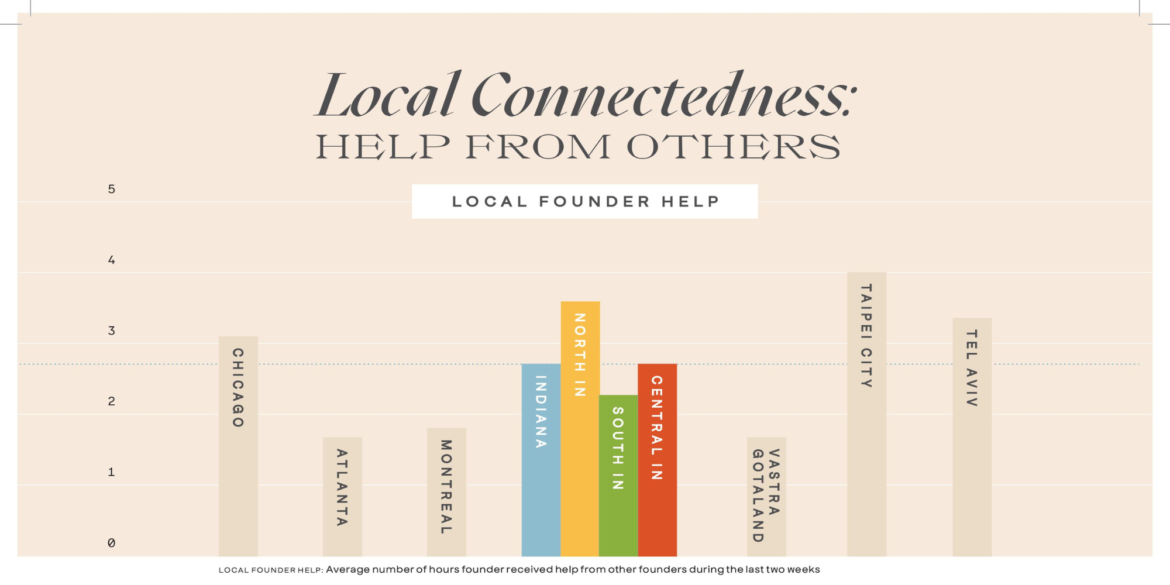This story is an excerpt from Entrepreneurship Indiana, an entrepreneurial yearbook published by the Indiana Economic Development Corporation (IEDC) in partnership with PATTERN to honor the state’s entrepreneurial ecosystem and inspire future founders. This annual publication features 100 entrepreneurial success stories, highlighting the ambition, commitment and resilience of entrepreneurs of all backgrounds across the state of Indiana.
With a growing portfolio of more than 125 clients across six continents, Startup Genome is a policy advisory and research organization that bolsters startup ecosystems—both public and private, in partnership with global thought leaders and practitioners.
Startup Genome is perhaps best known for its Global Startup Ecosystem Reports (GSER), first published in 2012. Ten years later, in his intro letter to the 2022 edition of the GSER, Startup Genome Founder and CEO JF Gauthier reflects on how that first report highlighted the Western and English-speaking cities in their findings. The results of the 2022 research show that startup ecosystems can now be found thriving around the world.
As the COVID-19 pandemic forced companies to find new virtual and digital iterations of previously physical realities, startups were, more often than not, rising to meet these critical demands. The 2022 GSER highlights this rapidly changing landscape and the cities leading the way in the Global Startup Ecosystem Ranking. Silicon Valley, New York, London, and Boston are the top four, followed by Beijing, Tel Aviv, Seoul, Tokyo, Singapore, and Sydney. The industries that spawn the most startups include artificial intelligence & big data, educational technology, financial technology, cybersecurity, clean technology, blockchain, digital media, gaming, and life sciences to name a few. And the GSER details the changes in rounds of funding and exits over time along with sub-sector trends.
In total, it’s nearly 400 pages of sophisticated data visualizations and analysis of these top cities and the regions they occupy along with the industries impacted. Due to its scope, the GSER takes the 10,000-foot view of these startup ecosystems, but within the North America regional analysis, two full pages are dedicated to the exploration of how “Local Connectedness Is Driving Indiana’s Thriving Startup Ecosystem.”
The report describes Indiana as “an affordable, affable startup hub” with startups, universities, and corporations dedicated to some of the world’s fastest-growing tech sectors including health and clean tech. In many ways, according to the Startup Genome findings, Indiana outperforms nearly all comparable ecosystems. The findings also predict that Indianapolis will start annually producing $100-million-plus scale-ups.
The prediction is based on data including a record year of investment in 2021 when Indiana startups collectively raised $1.4 billion across 159 deals and a 13% higher-than-peer success rate from Seed to Series A funding. The prediction is also tied to a long history of innovation and investment at top-tier universities in Indiana; the attraction and impact of major industries and corporations; and what is defined as its high degree of local connectedness—colloquially understood as “Hoosier hospitality applied to founders.”
Local Connectedness measures how much help an entrepreneur can get when they are stuck. Help can be from a peer, mentor, investor, or expert in the industry. Startup Genome has found that the regions with the highest levels of local connectedness accelerate all their entrepreneurs twice as fast in quarterly revenue growth compared to regions with low levels of local connectedness.
The report refers to Indiana as the birthplace of modern technology transfer in 1980 due to U.S. Senator Birch Bayh’s work on a law that established universities’ ownership of patents. This law led to a landscape that today includes Elevate Ventures and BioCrossroads, in addition to IU Ventures and Purdue Ventures. The facility of technology transfer also attracts companies such as MBX Biosciences. With more than $60 million in funding, the MBX Biosciences laboratory at Indiana University is developing a treatment for endocrine disorders based on discoveries made by its co-founder, the serial entrepreneur Richard DiMarchi.
According to the Startup Genome assessment, world-class degrees and research facilities offered through Indiana University, Purdue University, and the University of Notre Dame are attracting top national and international talent to Indiana. These same students are then often remaining in the state for its low cost of living and quality of life—expanding the pool of highly qualified engineering and business experts.
But not all entrepreneurs find their way to Indiana through a university. Formerly based in Israel, the agricultural tech startup Taranis relocated to Indiana due to its strong agricultural economy. Another example: formerly based in Oklahoma, the speciality chemical company MITO relocated in Indiana to be at the heart of manufacturing in the Midwest.
Haley Marie Keith, co-founder of MITO Materials, says it best: “Indiana’s strong ecosystem gives companies who grow here access to corporations that can be customers, mentors, collaborators, and investors.” Call it the “networkability” factor.
Startup Genome agrees that members of Indiana’s entrepreneurial network have “forged a strong sense of community and relationships among founders, investors, and experts, and this is what strengthens the ecosystem.” The GSER also notes that the network continues to grow as Hoosiers disperse around the world but maintain strong relationships in Indiana and often return, bringing their global connections back home.
It’s a spirit of connectedness worth celebrating and leaning into as Hoosier entrepreneurs and startups respond to new realities and new possibilities across industries and into the future.




